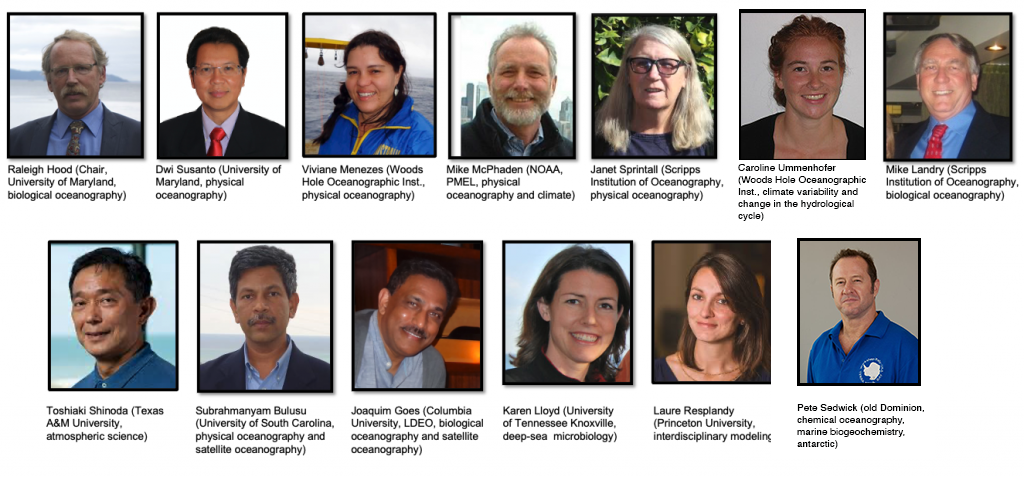Steering Committee

Introducing the US IIOE-2 Steering Committee
The launch of the Second International Indian Ocean Expedition (IIOE-2) has precipitated a renewed and growing interest in carrying out research in the Indian Ocean over the next 5 years and beyond. Many countries-including Australia, China, Germany, India, Indonesia, Japan, Norway, the United Kingdom, and the United States-are planning cruises and other activities in this time frame, and new regional research programs in the Indian Ocean are under development (Hood et al., 2016).
Because the funding for IIOE-2 research and societal applications is being generated within each participating country, the preferred model is for each country to have an IIOE-2 national committee with a chairperson who is the point of contact for the IIOE-2 Steering Committee and the IPO framework (IPC, 2015). National IIOE-2 committees have been established in India, Australia, Germany and the UK.A U.S. IIOE-2 Steering Committee was formed (fall 2015) in the United States to serve as a coordinating and implementing body for the U.S. contribution to the IIOE-2. This committee is composed of a highly interdisciplinary group of US scientists, all of whom have a strong interest in the Indian Ocean. The committee meets quarterly (via teleconference) and met in person at the 2016 Ocean Sciences Meeting in New Orleans.
The terms of reference for this committee establish the following goals:
- Write a U.S. IIOE-2 Science Plan and Implementation Strategy based on the workshop.
- Coordinate ongoing U.S. research in the Indian Ocean region and coordinate planning of new research.
- Provide a forum for U.S. interagency discussions of Indian Ocean research and a liaison between the scientific community and these agencies.
- Communicate U.S. research in the Indian Ocean region to national and international audiences through a Web site, newsletters, articles in the peer-reviewed and other literature, Twitter, and other approaches.
- Represent the U.S. community on the international IIOE-2 Steering Committee.
- Represent the U.S. community in international IIOE-2 meetings and discussions.
- Liaise with U.S. SCOR and IOC committees.
Raleigh Hood (Chair) - University of Maryland, biological oceanography
Joaquim Goes - Columbia University, LDEO, biological oceanography and satellite oceanography
Mike Landry - Scripps Institution of Oceanography, biological oceanography
Karen Lloyd - University of Tennessee Knoxville, deep-sea microbiology
Viviane Menezes - Woods Hole Oceanographic Inst., physical oceanography
Mike McPhaden - NOAA, PMEL, physical oceanography and climate
Laure Resplandy - Princeton University, interdisciplinary modeling
Pete Sedwick - Old Dominon University, chemical oceanography, marine biogeochemistry, antarctic
Toshiaki Shinoda - Texas A&M University, atmospheric science
Janet Sprintall - Scripps Institution of Oceanography, physical oceanography
Dwi Susanto - University of Maryland, physical oceanography
Caroline Ummenhofer - Woods Hole Oceanographic Inst., climate variability and change in the hydrological cycle
Former members
Lisa Beal - University of Miami, RSMAS, physical oceanography
Subrahmanyam Bulusu - University of South Carolina, physical oceanography and satellite oceanography
Greg Cutter - Old Dominion University, chemical oceanography
Henry Dick - Woods Hole Oceanographic Institution, marine geology and geophysics
Liviu Giosan - Woods Hole Oceanographic Institution, marine geology and geophysics
Jim Moffett - University of Southern California, chemical oceanography
Lynne Talley - Scripps Institution of Oceanography, physical oceanography
Jerry Wiggert - University of Southern Mississippi, interdisciplinary modeling
Chidong Zhang - NOAA, PMEL, atmospheric science
References
- Hood, R. R., E. R. Urban, M. J. McPhaden, D. Su, and E. Raes (2016) The 2nd International Indian Ocean Expedition (IIOE-2): Motivating new exploration in a poorly understood basin. ASLO Bulletin, 25(4): 117-124.
- IPC (2015) Implementation Strategy for the Second International Indian Ocean Expedition 2015-2020. (Ed. N D’Adamo). Written by: UNESCO IOC IIOE-2 Interim Planning Committee (Group of Experts). UNESCO Intergovernmental Oceanographic Commission (IOC), Paris, France.
Author Info: Professor Raleigh Hood is an expert in Biological Oceanography and Biogeochemical Modeling and chairs the group SIBER: Sustained Indian Ocean Biogeochemistry and Ecosystem Research
